“Let food be thy medicine and medicine be thy food.” — Hippocrates
Moms… Happy 8 months to you and your baby..! Confused about what to feed your baby? Looking for food recipes for your little one? So, this post is a must-read for you. In this post, an 8-month baby food chart, Indian recipes, and tips on how to feed the baby are discussed.
Before sharing Indian Food Chart Recipes for an 8-month-old Baby, let us know important tips on how to feed, which are discussed below.
Why a Balanced Diet is Essential for Your 8-Month-Old Baby’s Growth
A balanced diet is essential for your 8-month-old baby’s growth because it provides the vital nutrients needed for healthy development, strong immunity, and proper weight gain. At this stage, babies are ready to try a variety of foods from different groups, including grains, proteins like dal or lentils, vegetables, and fruits, all of which support brain and body growth. Indian baby food recipes for 8 months, such as khichdi, ragi porridge, or mashed vegetables, offer nutritious options that are easy to digest and introduce new tastes and textures, helping your baby develop healthy eating habits early on.
Baby Food Recipes 8 Months
Before sharing Indian 8-month-old baby food recipes Indian, let us know important tips on how to feed, which are discussed below.
Important tips on how to feed solid food to an 8-month-old baby:
- Always give properly cooked, softly textured, and easy-to-digest foods, and not the hard ones, as the baby’s digestive system is still developing.
- You can feed your baby thrice a day with a proper breakfast, lunch, and early dinner. Don’t force anything forcefully on the baby.
- Breast milk and formula milk should be continued.
- Always remember to go by the “3-day wait rule” before introducing any new food to babies.
While making a baby meal plan 8-month Indian diet, there are a few options that you should abstain from. Check out the Foods that are unsafe for your babies in the beginning stage.
- If a baby develops any food allergy, then stop feeding that food. Also, consult your paediatrician in such a case. (Diarrhoea, vomiting, constipation, rashes, and too much crying due to stomach pain are the symptoms in babies of any particular food allergy.)
- Avoid feeding Cow’s milk, raw vegetables, nuts, and too much salt and sugar before the age of one year.
- Feed your baby when he is sitting in a proper sitting position. Make your baby sit in the high chair while feeding.
Find the best high chair for your little one by clicking on the link mentioned below:
Best Baby High Chairs
- Be careful while feeding your baby, as the introduction of some solid foods can cause constipation in babies or diarrhoea too.
- Water intake is a must for a baby. Intake of water must be 2 to 4 ounces per day (i.e., 60 to 120 ml).
| [icon type=”icon-lamp”] You may be interested in knowing- Indian Food Chart for 8 Months. |
Why You Should Follow A Particular Diet Plan For 8 Months, Baby
Your baby is now moving about a lot and putting much effort into exploring their surroundings. Therefore, following a nutritious 8-month baby meal plan can help prevent your infant from being fatigued. So, include steamed veggies and fresh fruits in your 8-month-old baby’s diet plan. Healthy baby food ideas for 8 months include options like mashed banana, apple and pear sauce, butternut squash puree, green pea puree, mango and banana puree, sweet potato puree, and yoghurt with berries, as well as soft finger foods like stewed fruits and mashed paneer.
Homemade vs. Store-Bought Baby Food for 8-Month-Old Baby – Which One Is Better?
If prepared and kept correctly, homemade baby food recipes in India can be safer than anything bought from the store. It gives you complete control over how fresh and high-quality the components are. To guarantee safety, adhering to age-appropriate food guidelines and sanitary measures is imperative. Strict quality control measures are used for commercial baby food, offering an extra degree of confidence. Always see a paediatrician for advice.
Indian Food Chart Recipes for 6-month-old baby
So, here is the Indian Food Chart Recipes for 8 Months old Baby. And trust me, all are very easy to make.
Indian Food Chart Recipes for 8 Months Old Baby:
1. Suji Upma
As suji upma will have vegetables like carrots (which are rich in Vitamin A, Vitamin C, calcium and iron, and improve vision and blood circulation), Peas (considered a powerhouse of nutrients), Tomatoes (rich in calcium and Vitamin K- helps in building stronger bones) and onions (packed with Vitamin c, good for heart and source of antioxidants), so it is best nutritional meals for 8-month-old babies. Also, Suji (Semolina) enhances bone density, is good for the nervous system, and is excellent for the heart as well.
Ingredients:
- Suji (Semolina) Roasted
- Ghee (1 tablespoon)
- Peas
- Carrots
- Onions
- Tomatoes
How to prepare it:
- Heat oil in a pan.
- Add boiled veggies to it.
- Add suji and water to it.
- Mix them well and cook them on a low flame for 5-7 minutes.
- Pour it into a bowl and serve.
2. Oats + Apple Porridge:
Oats and apples are very nutritious and high-fibre foods. So, their combination will be a very nutritious meal for your little one. Thus, it is one of the best Indian food chart recipes for 8 months old Baby.
Ingredients:
- Oats (2-3 Tablespoons)
- Cardamom powder
- Milk (1 Glass)
- Almond powder
- Apple Puree
How to prepare Apple Puree:
- Steam the apple for 10-15 mins.
- Take off the peel of the apple.
- Let it cool down
- Blend it in a blender.
- Pour it into a serving bowl.
How to prepare Oats + Apple Porridge:
- Boil water in a pan.
- Add oats to it. And stir constantly until it gets thickened.
- Add a pinch of cardamom powder.
- Add 1 tablespoon of almond powder.
- Add Apple Puree. Mix it well.
- Turn off the flame.
- Add formula milk (optional) and mix it well.
3. Broken Wheat Porridge/ Dalia
Dalia is a very nutritious option for your baby in his/her growing years. It is best suited for babies above 7 months of age.
Ingredients:
- Broken Wheat/ Dalia (2 tablespoons)
- Milk (1 cup)
- Apple Puree/ Banana Puree
How to prepare it:
- Put a small amount of desi ghee in the pressure cooker. Heat it.
- Then pour Dalia into the ghee. Now roast in low flame until it is golden brown.
- Add a full cup of water to the cooker and close the lid.
- Cook it on medium flame.
- After 1 whistle, lower the flame.
- Let it remain on low flame for 10 minutes.
- Now switch off the gas. Open the cooker and add one cup of milk.
- Switch on the gas and let the dalia cook for 5 minutes.
- Apple Puree/ Banana Puree can be added for sweetness.
- It is ready to serve your little one.
4. Rasam Rice
Babies can be introduced to Rasam as their first solid food because it is easily digestible as well as tasty.
Ingredients:
- Jeera (Cumin)
- Garlic
- Curry leaves
- Tomato- 1 small
- Fresh Dhania (Coriander)
- Hing (Asafetida)
- Haldi powder (Turmeric Powder)
How to prepare it:
- Add ghee to a pan.
- Add jeera, curry leaves, garlic, and tomato and sauté them nicely.
- Add hing and haldi powder.
- Give a nice sauté.
- Add 1 cup water and let it boil for a few mins and switch off the flame.
- Take rice and mash it.
- Add Rasam to rice and mash it.
- Add dhania after the flame is switched off.
- Rasam rice is ready to serve.
5. Uttapam
It can be given to babies as finger food from 8 months. Thus, it is one of the best options for an Indian meal chart for baby growth for 8-month-old Babies.
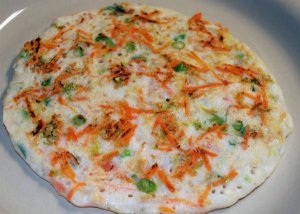
Ingredients:
- Suji (Semolina)
- Curd
- Onion
- Tomato
- Fresh Dhania
How to prepare it:
- Take suji and add curd to it.
- Mix them well and add water to them.
- Add onion, tomato and fresh dhania.
- Keep it aside for 10-15 mins so as to settle the batter.
- Suji absorbs the water quickly so you can add water accordingly if required.
- Meanwhile, heat a non-stick pan on a medium flame and add a few drops of oil to it.
- After the pan is properly heated add the batter to it and cook it properly. Make sure that it should not remain uncooked from any of the sides.
6. Smoothie: Apple/Banana Smoothie
Curd is rich in calcium, minerals, and vitamins essential for a baby’s growth. So, again, smoothie is one of the best Indian Food Chart Recipes for 8 Months old Baby weight gain food Indian chart. Moreover, your baby will relish its taste.
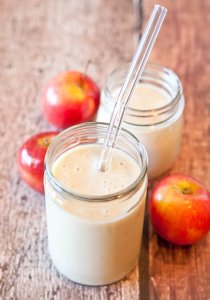
Ingredients:
- Curd (1/2 cup)
- Apple/ Banana
- Almond Powder
How to prepare it:
- Take yoghurt/curd.
- Add Apple/ Banana to it.
- Add almond powder.
- Bend all the ingredients in a mixer.
- Smoothie is ready to serve.
7. Dal Soup
Dal is rich in protein. This is one of the easiest recipes and the best dish for your baby.
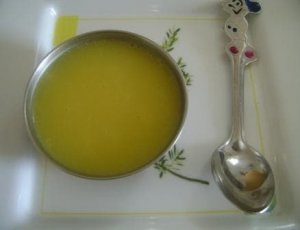
Ingredients:
- Yellow Moong Dal (2 Tablespoon)
- Water (1 cup)
- Turmeric (1 pinch)
How to prepare it:
- Soak the dal in water for 15-20 min.
- Now put the soaked dal in the cooker.
- Add 1 cup of water and 1 pinch of turmeric in that. Close the lid of the cooker.
- Cook for 2-3 whistles and then switch off the gas stove.
- Open the cooker after its pressure is released on its own.
- Pass this dal water through the sieve so that your baby can easily consume that smooth soup now.
- Make it sure when you offer to your baby, Dal Soup is not so hot.
8. Homemade Cerelac:
This is one of the most nutritious and healthy baby foods. Introducing solids to an 8-month-old baby, this food will help in gaining the baby’s weight as well. Don’t buy ready-made cereal when you can easily make it at home.
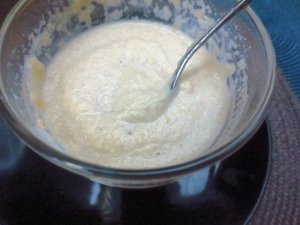
Ingredients:
- Boiled Rice
- Apple
- Formula milk
How to prepare it:
- Boil the rice.
- Steam an apple for 10-15 mins then take off its peal.
- Churn rice and apple in a blender.
- Add formula milk according to the desired consistency.
9. Ragi Sheera
Ragi is a highly nutritional food for babies. It has proteins, iron, calcium and minerals, so you can give Ragi Sheera to your 8-month-old baby.
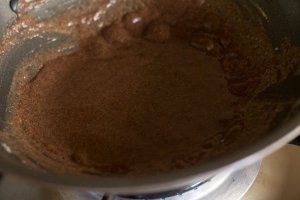
Ingredients:
- Ragi Flour (2 tablespoons)
- Gud (Jaggery) (1 tablespoon-organic)
- Water (1 cup)
How to prepare it:
- Mix ragi flour in water and break up the lumps.
- Add jaggery in it and cook it on medium flame.
- Stir constantly so as to avoid burning and forming lumps.
- After a few minutes, the mix will be thick.
- Switch off the flame and serve it.
10. Vegetable Khichdi
Vegetable Khichdi has so many vegetables in it which have their own nutritional values, so again it is the best Indian food chart recipe for 8 months old Baby.
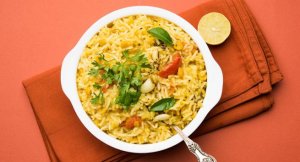
Ingredients:
- Brown Rice
- Dal
- Onion
- Tomatoes
- Peas
- Potato
- Carrots
- Beans
- Ghee (1 tablespoon)
How to prepare it:
- Keep brown rice and dal in water for 10 minutes. After 10 minutes throw the water.
- Heat ghee in a pan.
- Add chopped veggies to it.
- Now put brown rice and dal in it.
- Cook it on low flame for 20-25 minutes.
- Switch off the flame when it is cooked well. Let it cool down and you can blend it.
11. Suji Kheer
This is the best first food a mother should give to her little one. Suji (Semolina) enhances bone density, good for the nervous system and excellent for the heart as well.
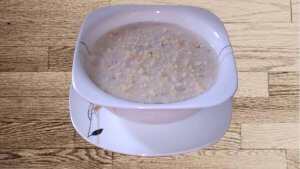
Ingredients:
- Suji (2 Tablespoon)
- Water (Double the amount of Suji)
- Desi ghee (1 Tablespoon)
- Almond powder (crush the almonds in a jar)
- Apple puree (for taste as sugar is not added)
How to prepare it:
- Dry roast Suji in a pan.
- Boil water in another pan.
- Add Suji to boiling water and make sure that there are no lumps of Suji.
- Add desi ghee to it. Add almond powder to it.
- Switch off the flame.
- If you wish you can add apple puree to it. Or you can add Breast milk or Formula milk to make it runnier. And it’s ready to serve it.
12. Oats + Banana Porridge
Oats are high in soluble fibre, calcium, B vitamins, and protein. Oats are a great food to add to your baby’s diet as it is very healthy and easy for the baby to eat. Including oats as part of your baby’s meals is an excellent way to introduce nutrient-rich food ideas for infants. They provide essential nutrients and can be served with a variety of fruits or vegetables to further boost their nutritional value.
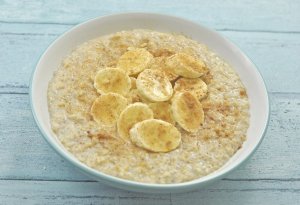
Ingredients:
- Oats (2-3 Tablespoons)
- Banana Puree
- Water (3/4 cup)
How to prepare it:
- Boil 3/4 cup water in a pan.
- Add oats to it. And stir constantly until it gets thickened.
- Switch off the flame and let it cool down.
- Add Banana Puree to it. The dish is ready to serve to your little one.
13. Suji Chilla
Suji (Semolina) enhances bone density, good for the nervous system and excellent for the heart as well. So, it is best to give it to your little one.
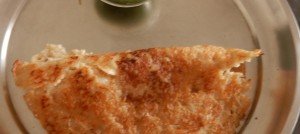
Ingredients:
- Suji
- Potato (boiled and mashed)
How to prepare it:
- Take a pan and pour suji into it. Roast it on medium flame till it changes colour slightly.
- Once it cools down then pour mashed potato into suji.
- Add water to it to make this consistent.
- Take a non-stick pan and put ghee in it.
- Pour the batter into the pan and on a low flame make a chilla.
14. Vegetable Dalia
As vegetable dalia will have vegetables in it so the dish will be highly nutritious for your baby.
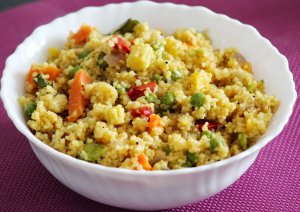
Ingredients:
- Broken Wheat/ Dalia
- Carrot (chopped fine pieces)
- Peas
- Potato (chopped fine pieces)
How to prepare it:
- Put a small amount of desi ghee in a pressure cooker. Heat it.
- Then pour Dalia into the ghee. Now roast in low flame until it is golden brown.
- Put all veggies in it.
- Add a full cup of water to the cooker and close the lid.
- Cook it on medium flame.
- After 1 whistle, lower the flame.
- Let it remain on low flame for 10 minutes.
- Now switch off the gas. It is ready to serve your little one.
NOTE: These recipes are just an idea, you can make them in whichever way you want to.
15. Broccoli Soup Recipe
Broccoli is very nutritious and tasty too. You can give your baby broccoli soup, which is very healthy for your baby and provides essential nutrients for 8-month-old babies. Here is the recipe for broccoli soup.
Ingredients
- Butter -1 teaspoon
- Broccoli florets- 1cup
- Pepper powder- a pinch
- A pinch of salt
How to prepare
- Take a pan, put some butter in it and let it melt.
- Take some broccoli florets and saute them for a couple of minutes.
- Now cover the pan with a lid and cook nicely.
- Let the broccoli cool down, then blend in a fine paste.
- Take another pan, add broccoli paste, some butter, a pinch of salt, and pepper powder to it, and cook it again for a few minutes. Feed the baby once it cools down.
16. Fish Puree Recipe
We are all aware of the benefits of eating fish. You can give these vitamins to your little ones also. Here is the recipe for fish puree. It’s so easy to make and yummy too. We are sure your baby will love it. If you are planning your baby’s meals, consider adding this to your Homemade food chart for baby health to ensure a nutritious and balanced diet.
Ingredients:
- Cleaned and prepared fish
- Water – 1 cup
How to prepare it:
- Boil the water in a vessel.
- In a small vessel take the chopped fish and place this vessel inside the vessel containing water.
- Cook the fish properly till its colour changes to white.
- Grind the cooked fish to puree and add the salt, black pepper powder, and jeera powder to taste.
17.Carrot Wedges Recipe
Carrots are loaded with a lot of nutrients and vitamins. It is very good for the eyes. Carrot wedges are the perfect finger food that you can give to your little one as an evening snack. Here’s how you can make carrot wedges.
Ingredients:
- Carrots (wedges) – 1 cup
- A pinch of salt
- A pinch of black pepper powder
- Ghee – 1 teaspoon
How to prepare:
- Take the pan, add a good amount of water, boil it completely, and now add carrot pieces.
- Cook it till it becomes soft, then turn off the flame.
- Take some ghee in the pan, add the carrot pieces to it, and saute for 2 minutes
- Add the salt and black pepper powder and mix well.
- Switch off the flame and allow it to cool. Once it cools, give it to your baby.
Common Feeding Mistakes Parents Make – And How to Avoid Them
It is natural for all parents to make some or other mistakes while feeding their children. After all, even they are humans! Some of the common mistakes that they must avoid are:
Introducing Solids Too Early or Too Late
Feeding solid food to babies can overwhelm their digestive system, whereas delaying it can hinder their nutrient intake and overall development.
Forcing Baby to Finish Food
Don’t pressurise the baby to eat everything served on their plate. It will create negative associations with meal time and disrupt their hunger cues.
Relying Only on Purees for Too Long
Don’t just stick to feeding them purees during the initial feeding stages. It can delay the development of their chewing skills and acceptance of different textures.
Skipping Variety in Food Choices
Don’t just offer limited food options as it restricts their exposure to new tastes and nutrients. This will make them choosy.
Ignoring Allergic Reactions
Watch out for the signs of food allergies as it can put your baby’s health at risk. Always introduce one food at a time and carefully observe their reactions.
Not Maintaining Consistent Feeding Times
Irregular meal schedules can affect appetite regulation and make it harder for a child to develop healthy eating patterns.
Giving Sugary or Processed Foods Too Soon
Introducing sugary or processed foods early can lead to poor eating habits and increase the risk of obesity and dental issues later on.
Additional Feeding Tips
Keep these tips in mind while feeding your baby:
- Remember that breast milk or formula milk should remain the primary source of nutrition for an eight-month-old baby. Besides starting with solid food, it is recommended to feed one or two sessions to babies up to one year of age. This aligns with the recommended 8-month-old baby feeding schedule, where most babies have 4 to 5 feedings of breast milk or formula a day, along with 1 to 2 solid meals.
- Avoid giving cow’s milk to your baby before he turns one.
- Always feed the baby in a particular position and location every day. This develops a strong connection in their mind between food and the place where they are being fed.
- Keep the consistency of the food a little grainy so that your baby will love to eat it. It will help your baby transition from mashed to solid foods.
- Always prepare and store your baby’s food in glassware. Don’t use plastic containers as they contain harmful chemicals.
- It is of consequence to remember that you should take it slow and steady while introducing new foods to your baby.
- The food chart for an 8-month-old baby should first include single-ingredient purées, and gradually you can start combining ingredients as per the tastes and preferences of your child.
- If you feel that your baby isn’t able to keep certain foods down, or if there are regular bouts of diarrhoea, we suggest you check with your paediatrician.
So, these were Indian Food Chart Recipes for 8-month-old Babies. Just remember to go by the “3-day wait rule”.
Why a Balanced Diet Matters for Your 8-Month-Old Baby
At 8 months, your baby’s growth is rapid—here’s why balanced nutrition is key right now.
| Nutrient | Why It Matters | Common Food Sources |
| Iron | Supports brain development and prevents anemia | Lentils, spinach, fortified cereals, meat |
| Calcium | Builds strong bones and teeth | Yogurt, paneer, milk, green leafy vegetables |
| Protein | Essential for growth and muscle development | Dal, egg yolk, mashed chicken, paneer |
| Vitamin A | Supports vision and immune system | Carrots, sweet potatoes, pumpkin |
| Vitamin C | Enhances iron absorption and boosts immunity | Citrus fruits, tomatoes, guava |
| Fiber | Aids digestion and prevents constipation | Oats, fruits, vegetables |
| Healthy Fats | Important for brain growth and energy | Avocado, ghee, butter |
| Zinc | Supports immunity and cell growth | Meat, lentils, nuts |
Tips To Increase The Appetite For An 8-Month-Old Baby
Your 8-month-old baby’s appetite might be increased. To make this happen, follow these easy tips:
- Include Superfoods
For children between the ages of 8 and 12 months, ajwain, ginger, basil, cinnamon, and asafetida are great appetite boosters.
- Make Eating Fun
Try presenting food in various ways. Children react strongly to colours and forms when they are 8 months old.
- Include More Zinc
Eating beans, pumpkin seeds, chicken, and yoghurt can improve zinc intake.
- Avoid Force-Feeding
Give your baby the freedom to turn down food and give it another go later. Your child will experience stress at mealtimes if you force-feed them.
Conclusion – The Key to Your Baby’s Growth: Balanced Meals
A balanced diet for an 8-month-old baby is essential for healthy growth and development, including a mix of fruits, vegetables, grains, pulses, and dairy. Buding Star provides expert guidance and easy-to-follow food charts to help you introduce nutritious, age-appropriate meals for your little one.
Explore Buding Star’s resources for more tips and recipes, and ensure your baby’s plate is always full of goodness. Ready to give your child the best start? Visit Buding Star now for your complete baby food guide!
Faqs:
1. How much solid food should an 8-month-old child eat?
At around 8 months, your baby will have tried several different kinds of foods and have favourites too. They will begin to chew some solid foods and swallow mashed food easily. But they still get half of their calories from formula or breast milk. You can give Indian food to the 8-month-old baby as a solid food at least twice or thrice a day, you can later increase this gradually.
2. What vegetables should an 8-month-old eat?
While putting together an 8-month baby food chart, you should make sure that your baby is consuming almost half a cup of soft food almost four times a day. You can feed your baby mashed veggies as well as some steamed veggies when they start chewing. You can find several 8-month-old baby food recipes Indian online and feed them veggies like carrot, beetroot, sweet potato, mushroom, broccoli, spinach, pumpkin, etc. Look for easy baby food recipes for 8-month-olds that incorporate lots of steamed and mashed veggies. This should be accompanied by a healthy snack once a day. Furthermore, an 8-month baby diet chart should also consist of 12-24 ounces of breastmilk or formula milk every day.
It is important to remember that one should not indulge in forced feeding, and one can allow the child to increase their solid food intake at their own pace. Force-feeding or excessive solids can cause instant weight gain and a reduction in the consumption of important nutrients in kids.
3. What can I feed my 8-month-old for breakfast?
At 8 months old your baby has started eating solids, and it can be a tricky time for you to plan a well-rounded 8-month baby food chart. They will require almost 750 to 900 calories every day, and you will have to figure out a way to divide that judiciously between milk (breast milk or formula milk), solids, and semi-solids. An 8-month baby diet chart can consist of fruit apple smoothies, oatmeal, suji Upma, curd rice, dal rice, mashed potatoes, and a variety of other food products that are easier to chew and slightly coarser than purées.
You can feed several options to your little one for breakfast, such as idlis, sweet potato, beetroot-broccoli-mushroom soup, sooji upma, jowar puffs, apple puree, sathu or barley mix, etc. Keep the recipes simple yet tasty so that your baby develops a taste for healthy foods. You can check out 7-month baby diet charts and find different recipes you love. Keep your little one busy in between meals with these minor games for kids.
4. What should babies eat at 8 months?
Babies can start eating a wide range of food from 8 months baby food chart indian. They can have pureed or strained fruits such as apple, pear, banana, mango, peaches, and avocado, mashed veggies like sweet potato, beetroot, broccoli, and spinach, legumes like chickpeas, fava beans, lentils, kidney beans, etc., and cereals such as oats and wheat. You can also give certain dairy products like cheese, cottage cheese, and unsweetened yoghurt.
5. What finger foods can I feed my 8-month-old?
While incorporating finger foods in your 8-monthly baby food chart, always remember to incorporate foods that are easy to chew, as your baby might not have teeth as of yet. You can steam vegetables like carrots, beans, potatoes, broccoli, and pumpkin, and offer them to your child. You can also incorporate soft cheese, banana slices, avocados, peaches, etc., into your baby’s diet.
6. Can I use mild spices in 8-month-old baby food recipes?
The idea behind avoiding spices in baby recipes for 8-month-olds is to turn the problem of any tummy issues or struggles. However, if you wish to incorporate spices into your baby’s diet, we suggest that you begin with one spice at a time and wait for at least four days before introducing a new one. It is always a good idea to take it slow and steady while putting together recipes for an 8-month-old baby.
7. Can food induce diarrhoea in an 8-month-old baby?
Diarrhoea in infants should always be checked by a paediatrician. At times, a change in the mother’s diet can have an impact on the baby’s health if she is breastfeeding. Lactose intolerance, food allergies, and other reasons can also be attributed to diarrhoea in babies, but any inference about the situation should be corroborated by your child’s healthcare provider. Having said that, hydration is very important when your child is having loose stools or diarrhoea. Keep giving them water, ORS, or other liquids to keep their salt and sugar levels replenished at all times.
Incessant passing of stools can also cause diaper rash in babies, and parents should take proper care to manage this situation.
Also read: how to avoid diaper rash in babies
8. What to do if my 8-month-old baby refuses to eat?
It is very normal for an infant to avoid food or even meals altogether. The best thing to do in such a situation is not to panic. Do not force your child to eat, as it will provide him with a negative reinforcement attributed to eating. Instead, wait it out and try preparing and offering some other 8-month-old baby food recipes. You can also offer the same food at different times to encourage your child to eat. Getting an infant to eat requires a lot of creativity, persistence, and patience. So, don’t worry and keep at it.
Read More Posts:
50+ Mother’s Day Wishes and Messages To Send To Your Mom | First Birthday Party Themes For Baby Boys in India | Safe Period Calculator | Baby Boy Names With Meaning | Top Facebook Groups For Indian Moms | Symptoms of Baby Boy During Pregnancy | 10 Month Baby Food Chart | Home Remedies To Treat Gas In Babies | Fancy Dress Ideas For Girls | 9 Month Baby Food Chart | Easy To Play Games For Kids | How To Teach Kids To Share | Best Boating Places In Bangalore | Fancy Dress Ideas For Kids | Home Remedies For Baby Hair Removal | Importance of Games and Sports in Student’s Life | Letter to My Son on his 11th Birthday | Role of Social Class in Parenting
- 7 Month Baby Food Recipes - January 19, 2021
- 7 Months Old Baby Food Chart with Indian Recipes - January 19, 2021
- 9 Month Baby Food Chart - January 14, 2021
- 9 Month Baby Food Recipes - January 14, 2021
- 10 Month Baby Food Chart - January 14, 2021
- 8 Months Baby Food Chart for Indian - January 14, 2021
- 20 Best Indian 6-Month Baby Food - January 14, 2021
- Indian Food Chart Recipes for 8 Months old Baby - February 20, 2018
- Indian Diet Plan for 6 Months Old Baby - January 12, 2018

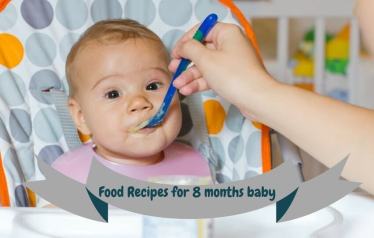
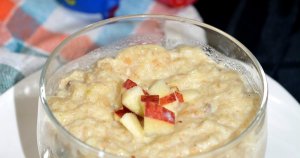
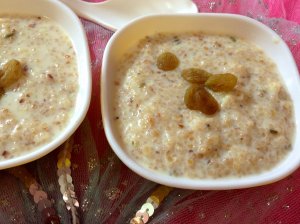
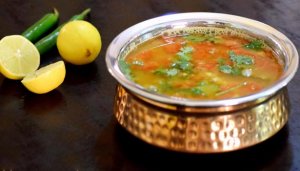












Well written article by Isha Ahuja. Which food is suitable for 8 months old baby is always a big question for parents. This article is very informative as it gives full knowledge for the same.